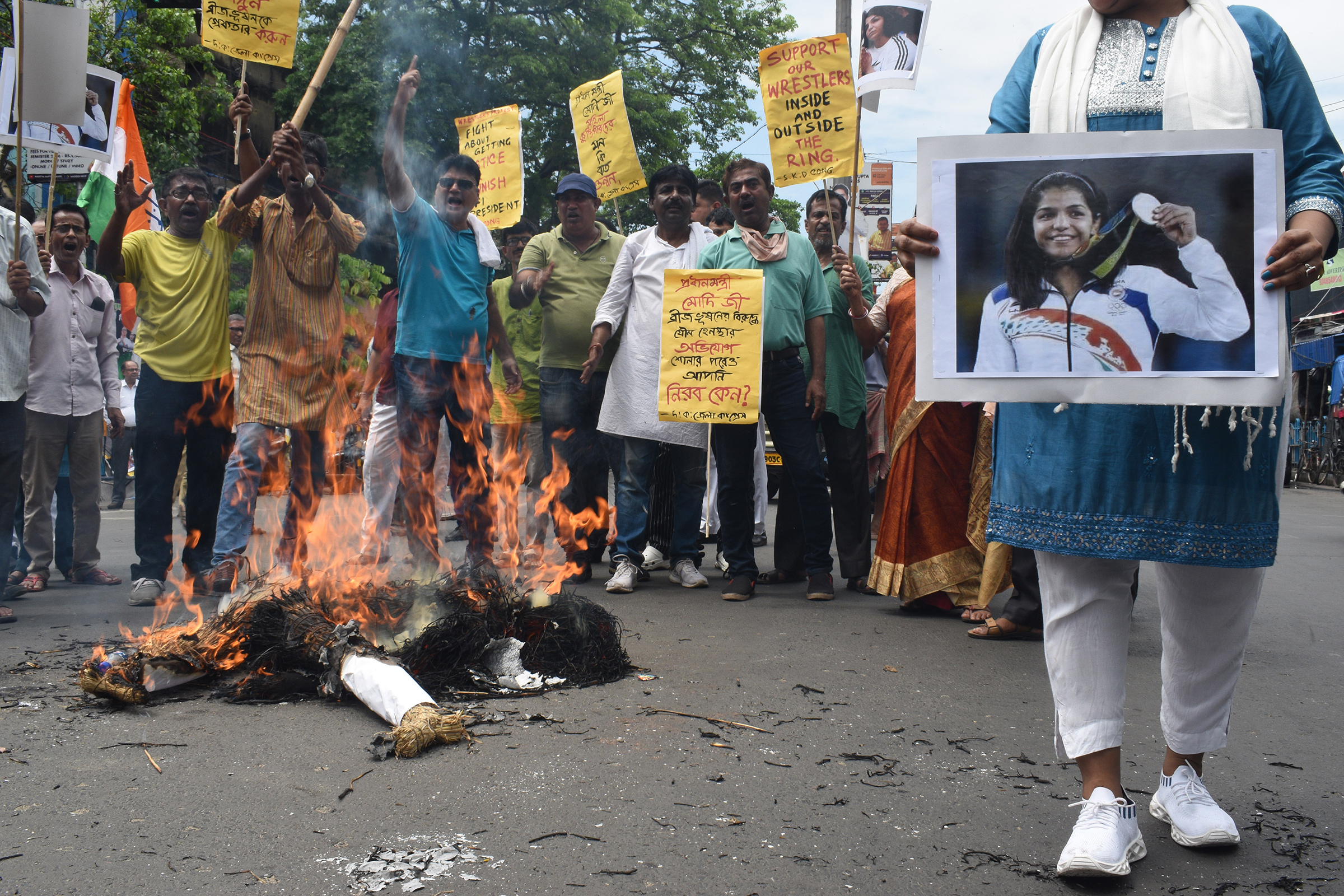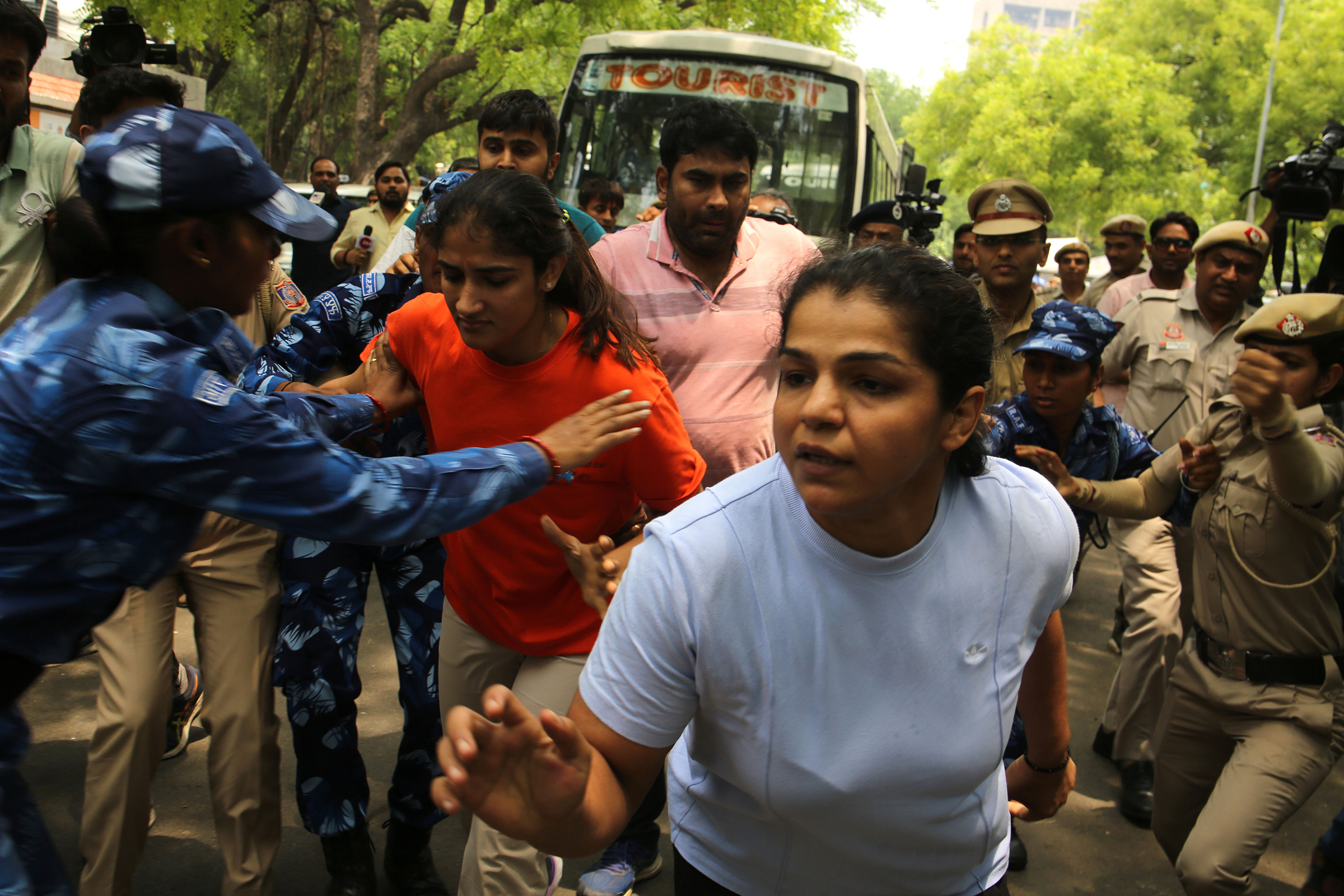Sakshi Malik tearfully held her Olympic medal close to her chest as she prepared to immerse it in the waters of the Ganges River on Tuesday as part of an ongoing fight against sexual harassment in Indian wrestling. The 30-year-old became India’s first female wrestler to win an Olympic medal in 2016, but seven years later, Malik, along with a group of Indian wrestlers, is calling for the arrest of Brij Bhushan Singh, the head of the Wrestling Federation of India (WFI) and an influential Member of Parliament from the Bharatiya Janata Party—whom they allege of pervasive sexual misconduct over the years. (Singh has denied the allegations.)
“For us, our medals are sacred, and so is the river Ganges,” the wrestlers said in an official statement on Tuesday. “This holy river is the perfect custodian of our medals, not the system that shields the offender.”
The dramatic scenes continued to unfold in the holy city of Haridwar in northern India until Naresh Tikait, an influential farm union leader, met with the wrestlers later on Tuesday to convince them to postpone the medal immersion until next week. “Because of them, we hold our head high in the international sports arena,” Tikait told the local press.
On Tuesday night, the controversy escalated further when United World Wrestling (UWW) officially condemned the treatment of Indian wrestlers and called on authorities to “conduct a thorough and impartial investigation into the allegations.” The governing body also reminded the Indian Olympic Association to hold fresh elections for a new leader of WFI within 45 days, as it had promised in April, and warned that failing to do so may lead UWW to “suspend” the federation and force the athletes “to compete under a neutral flag.”


The wrestlers’ protest has sparked an unprecedented reckoning with the sexual harassment of female Indian athletes. Wrestling is the country’s most successful sport in the Olympic arena, with wrestlers winning 6 of the 21 medals won by Indian athletes in the past.
For female wrestlers, who mostly hail from poor families in the northern farming state of Haryana, competing in professional sports provides financial mobility and new opportunities. Many have been reluctant to speak out against what activists call the pervasive issue of sexual harassment.
“We will continue to protest because the government is not listening to us and we have not yet received justice,” Malik tells TIME. “This fight is no longer only for India’s female wrestlers, it is for the daughters of India whose voices have been silenced time and again.”
How did the protests begin?
In January, the wrestlers gathered outside WFI headquarters in New Delhi after Vinesh Phogat, a two-time world champion, said she had received a phone call from young female wrestlers alleging that Singh had sexually harassed them. Phogat said at least 10 women have come forward with such allegations, and that past cases of sexual harassment reported to the authorities had either disappeared or prevented the athletes from competing again.
Malik says that along with allegations of sexual harassment, Singh had also allegedly mistreated women for years through sexist behavior like body-shaming, calling them “manly,” and making comments about their athletic wear.
Since then, several wrestling champions including Malik, Phogat, and Bajrang Punia have held sit-ins in Delhi to demand action against Singh. They have also opted out of championships and tournaments and threatened to return their medals to the government.


On Sunday, Delhi police detained Malik, Punia, and Phogat for marching to India’s new parliament building as it was being inaugurated by Indian Prime Minister Narendra Modi. In viral footage and images, the police are seen pushing, shoving, and manhandling many of the athletes and dragging them away to buses. The police have since filed cases against the wrestlers for rioting and public disorder and cleared out the protest site, sparking criticism from many public figures for their actions.
In their statement on Tuesday, the wrestlers decried the police action taken against them. “Have female athletes committed some crime by asking for justice for the sexual harassment committed against them?” they wrote.
Who is Brij Bhushan Singh, and what action has been taken against him so far?
Singh, who has led WFI for over a decade, continues to vehemently deny the allegations. “If a single allegation against me is proven, I will hang myself. If you [wrestlers] have any evidence, present it to the Court and I am ready to accept any punishment,” he said during a press conference on Wednesday.
Singh was suspended from his position as WFI chief by the Indian Sports Ministry in January amid the allegations, which set up a panel to oversee WFI’s activities. On April 25, the ministry said that WFI lacked an internal complaints committee mandated by law. However, it did not address the allegations against Singh, who has since resumed presiding over wrestling tournaments.
In May, the wrestlers petitioned the Indian Supreme Court, arguing that Delhi police had failed to register an official case against Singh despite several complaints of sexual misconduct. Three days later, the police registered two cases against Singh; he has so far been questioned but not charged.

Beyond the sexual assault allegations, there are currently four pending criminal investigations against Singh, including one for attempted murder.
What’s next for the wrestlers’ protest?
Malik says that the wrestlers’ protest will continue to demand a change in WFI’s leadership so that female wrestlers can compete in wrestling championships in the future “without any fear and hesitation.” Aside from immersing their medals in the river, the wrestlers plan to go on an indefinite hunger strike in New Delhi.
Experts say the wrestlers’ display of unity has shone a spotlight on sexual harassment in Indian sports, and increased pressure on authorities to tackle it. A recent Right to Information Request, similar to a Freedom of Information Request in the U.S., revealed that 45 complaints of sexual misconduct had been filed against coaches and officials from the Sports Authority of India (SAI) from 2010 to 2020.
“This wrestlers’ protest, unprecedented in Indian sporting history, has exposed to a wider public every fault line and fracture in our sporting structures,” wrote Sharda Ugra, a renowned Indian sports journalist.
More Must-Reads from TIME
- Cybersecurity Experts Are Sounding the Alarm on DOGE
- Meet the 2025 Women of the Year
- The Harsh Truth About Disability Inclusion
- Why Do More Young Adults Have Cancer?
- Colman Domingo Leads With Radical Love
- How to Get Better at Doing Things Alone
- Michelle Zauner Stares Down the Darkness
Write to Astha Rajvanshi at astha.rajvanshi@time.com
